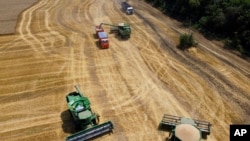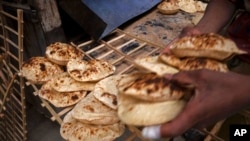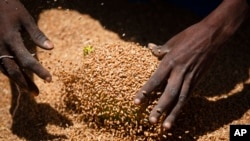Development organizations around the world are warning that Russia’s war on Ukraine will significantly damage the global economy, with the world’s poorest people suffering the brunt of the harm.
Russia and Ukraine are both major producers of commodities that are bought and sold globally, including wheat and other cereal grains, fertilizer and energy. With little or no cargo moving through the two countries’ ports on the Black Sea, export restrictions on food in Ukraine and massive economic sanctions levied on Russia, the disruptions to global supply chains are already large and growing.
Last week, the Organization for Economic Cooperation and Development (OECD) issued a report warning of significant economic damage.
“Amid the uncertainty, the OECD estimates global economic growth could be more than 1 percentage point lower this year than was projected before the conflict, while inflation, already high at the start of the year, could be higher than it would have been if war had not broken out by at least a further 2.5 percentage points,” the report said.
‘A crisis on top of a crisis’
The OECD and other groups that are focused on development and poverty reduction said poor countries, some already facing major crises, would be hardest hit.
“This is a crisis on top of a crisis for low-income people everywhere, particularly in countries that depend on Ukraine for grain or other food products,” said Sarah Saadoun, a senior researcher for Human Rights Watch focusing on poverty and inequality.
“This is coming at a time when there is already rising inflation, particularly for the cost of food, because of supply chain issues stemming from the pandemic,” Saadoun told VOA. “A lot of the countries that are dependent on Ukrainian grain are already in crisis, like Lebanon, Yemen and Syria. [Others] have inadequate social protection systems, meaning that the government does not provide support to people who are unable to afford basic goods.”
An analysis by the Center for Global Development predicted that the crisis in Ukraine would push an additional 40 million people around the world into poverty, while simultaneously making life worse for the tens of millions already there. The primary driver is the increased price of food.
“We saw [food prices] peak probably a week ago,” Ian Mitchell, co-director of Development Cooperation in Europe at the Center for Global Development, told VOA. “But it is now settling at this level, which is 50% above where it was six months ago. And I think that will start to feed into people's shopping baskets very soon.”
Mitchell added, “In lower-income countries where people typically spend a very large portion of their budget on food — often, in some cases, over half — these 50% increases in food prices are a really big deal, alongside energy costs, which have also spiked.”
Aid delivery challenges
Michael Sweikar, executive director of the Pulte Institute for Global Development at the University of Notre Dame, told VOA that the global nature of the crisis makes it especially challenging for aid groups looking to deliver relief.
"These types of situations make what is already challenging even more difficult,” he said. “When supply chains break, it makes it even harder for humanitarian aid programs and food security programs to deliver results.”
Sweikar said that it is important for aid groups and governments to be aware that the situation in Ukraine could become significantly worse, possibly drawing in neighboring countries and expanding the conflict, which would further disrupt aid flows.
Mitchell, of the Center for Global Development, said that another complicating factor could be broad export bans in countries that produce large amounts of food. Past crises have seen major producers of commodities such as rice restrict exports during a crisis, further driving up prices.
He said that since 2007, when a number of countries restricted food exports, nongovernmental agencies have worked to educate leaders about the need to allow global markets to continue operating.
“I’m optimistic there's a better understanding of conditions and the need for markets to respond,” he said. “Fingers crossed, that might mean that they allow producers to respond by keeping markets open. That wouldn't alleviate the prices we've got at the moment, but it would stop things getting worse.”
Steps to take
Saadoun of Human Rights Watch called on governments and other institutions to act now.
“Governments that are in position to provide humanitarian assistance, or institutions that are in position to provide aid, should increase that assistance to make sure that countries where there was an underlying crisis, like Yemen, like Lebanon, simply have the means to support people’s ability to afford food,” Saadoun said.
She said some countries facing shortages could take steps to protect themselves. The Libyan government stepped in to regulate prices for staple foods; Lebanon’s government directly purchased grain supplies; and Egypt expanded its cash-transfer program.
“These are examples of things that governments can and should be doing,” she said. “And for governments that were considering cutting subsidies, clearly, this is not the time to do that.”








